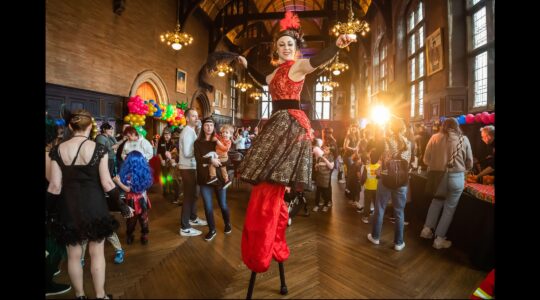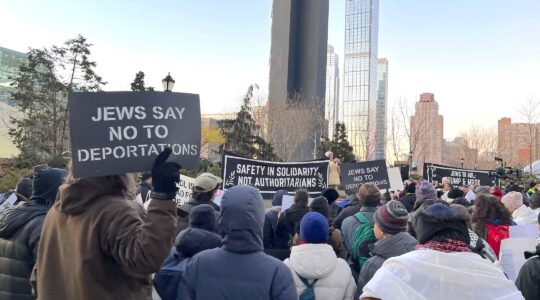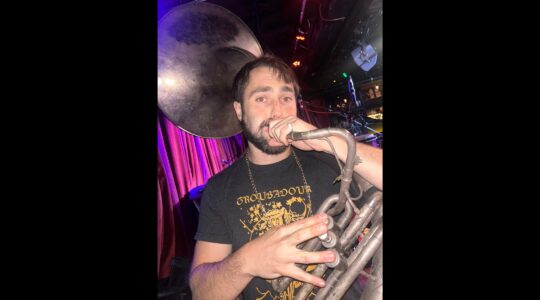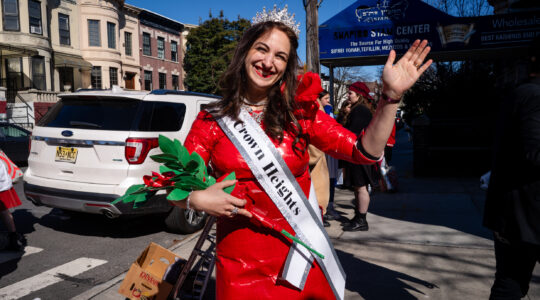Yiddish is the "mama loshen" to most Jews, the "mother tongue" spoken by generations of parents and grandparents. To David Roskies, Yiddish is also the language of his schooldays: the "lehrer loshen," or teacher language.
Raised in the 1950s in Montreal, Roskies attended one of a dozen secular schools where Yiddish was the language of instruction for much of the curriculum, from reading and grammar to Bible and history. Today, says Roskies, a professor of Jewish literature at the Jewish Theological Seminary of America, most students learn Yiddish as a "professorial language."
"In an academic setting, Yiddish is compartmentalized according to discipline: linguistics, literature, folklore, cultural studies," Roskies told The Jewish Week. The academic study of Yiddish serves the purpose of scholarly inquiry, he says. But as a result, it lacks the sense of cultural "wholeness" and communal warmth that marked Yiddish-language studies of his youth.
Roskies and a handful of fellow academics are working to reconstruct the social, religious and intellectual contexts within which Yiddish culture once thrived. For three of the past four summers, these professors have invited a select group of advanced students to an intensive, graduate-level seminar conducted entirely in Yiddish. "This is really Yiddish finishing school," Roskies says.
The seminar does not attempt to foster Jewish life or to cultivate popular aspects of contemporary Yiddish culture, organizers say.
"Our goal is to train scholars, not just knowledgeable Jews in the Jewish community," says Eugene Orenstein, a professor of Jewish studies at McGill University in Montreal. While the graduate students have demonstrated their dedication to the study of Yiddish, and their admiration for Yiddish culture as bilingual and multi-ethnic, nearly a quarter of this year’s class is not Jewish.
So far some 100 students have attended the advanced seminar, first held four years ago at the Sholem Aleichem House in Tel Aviv. This year, 27 students from as far as Argentina and Finland gathered at JTS for courses on the theme of "Yiddish in New York City" since 1880.
Roskies together with David Fishman of JTS, Rakhmiel Peltz of Drexel University in Philadelphia, Ruth Wisse of Harvard, Orenstein and Avrom Nowesztern of Hebrew University in Jerusalem gave lectures in literature, history, ethnography, intellectual life, the labor movement and tools for scholarly research. They also indicated areas in need of in-depth study using Yiddish-language sources, such as the history of the Jewish labor movement or the cultural role of the Jewish press.
"We tried to give as many varied perspectives of Yiddish culture in New York as we could in order to recreate a sense of wholeness," Roskies explains. "In many ways, we teachers were in the same situation as our Yiddish teachers decades and decades ago."
Roskies and his colleagues belong to the last generation of secular Jews to have been raised "as part of a matrix of school and street," in Yiddish-speaking neighborhoods and a Yiddish secular school system, he says. "We went into this profession because we had that as our foundation."
The previous generation of teachers had come from Eastern European communities where "Yiddish was everything," Roskies says. They created a pedagogical philosophy called "integrale Yiddishkeit," or integrated Yiddish, in which the language carried the lessons of ethical values, behavior and national ideals.
"It was a utopian experiment, and they knew it was a losing battle," Roskies says of his teachers. "But it was supported by other institutions: the press, the [Yiddish] theater, political activities. Everything was done in Yiddish. There was a vibrant cultural life outside of the school that reinforced what the school was trying to do."
That Yiddish world is all but gone from most places outside of chasidic communities and a small coterie of secular Yiddish enthusiasts. Even Roskies’ alma mater has scaled back its Yiddish lessons.
Still, Yiddish has experienced a small, but remarkable academic revival. In 1968, Columbia University and the YIVO Institute for Jewish Research started the Uriel Weinreich Yiddish summer program. Since then, universities around the world have added Yiddish language and literature to their undergraduate course offerings. Graduate students can pursue advanced degrees in Yiddish at perhaps a dozen institutions, including Columbia, Harvard, JTS, the University of California Los Angeles, the University of Michigan and the University of Ohio.
Outside of classes, students gather with other local Yiddish speakers in discussion groups and find Yiddish wherever they can: at klezmer music concerts; on the Internet, where the entire collection of the National Yiddish Book Center is available in digitized form; or in the pages of the Yiddish Forward, where most of the small staff of editors and reporters are under the age of 50.
In New York, there’s Yugntruf, a 35-year-old group that promotes "living Yiddish" through social gatherings, creative writing circles and discussion groups. The group’s new project, called "Svive," brings people together in groups of three to 12 people by neighborhood.
After completing advanced language classes, most students, however, have nowhere to further their scholarship, Roskies says. And many graduate students work in isolation. "If this is going to be the next generation of Yiddish scholars," Roskies says, "they really should gel as a group."
Bonds were clearly forged at this year’s seminar, cosponsored by JTS, Beit Sholem Aleichem, the Yiddish Department of the Hebrew University in Jerusalem and YIVO. Gathered around tables for a recent evening of song, skits and a light buffet at JTS, the students spoke to one another exclusively in Yiddish, breaking into English only to answer a reporter’s questions.
They sang labor songs and love ballads, including one by Arlo Guthrie’s grandmother, and watched as Yuri Vedenyapin and Shane Baker performed a Yiddish translation of Alexander Pushkin’s "Mozart and Salieri," which Vedenyapin composed in two hours during one sleepless night.
"It went so smoothly it was as if Pushkin had written it in Yiddish and I was restoring it," says the Moscow-born sophomore at Harvard. There he says, Yiddish, a language derived from medieval German and Hebrew, is taught in the Department of Near Eastern Languages.
Shane Baker, a Catholic who has just returned to New York from the University of Texas at Austin, where he completed a master’s thesis on the Vilna theater troupe for the Germanic Studies Department.
As a child growing up in the Midwest in the ’70s, Baker became interested in Yiddish while watching Marx Brothers movies. Hearing Groucho use the word "schnorer," Baker says he asked his father what it meant. He was told it was a made-up word. (It means cheapskate in Yiddish.) "How are gentiles in Kansas City supposed to know?" Baker says with a laugh.
He studied Yiddish independently at first, then took courses at Workmen’s Circle and YIVO before beginning graduate work in Austin. "I spent my time proving [my father] wrong," says Baker, who now works as program director at the Congress for Jewish Culture, a Yiddish organization in New York.
In Argentina, there are no Jewish studies and no Yiddish studies, according to Susana Lea Skura, a researcher at the University of Buenos Aires. So, she became an ethnolinguist and an anthropologist to study the use of Yiddish in vernacular Spanish and the development of Yiddish theater in Buenos Aires.
"For me, it’s very important to find people at my level of study, people my age [and] to speak with good professors and specialists of Yiddish," Skura, whose family spoke Yiddish at home, says in halting English.
Roskies says he will feel the seminar is successful if students come to think of him as "lehrer," rather than "professor."
The New York Jewish Week brings you the stories behind the headlines, keeping you connected to Jewish life in New York. Help sustain the reporting you trust by donating today.




